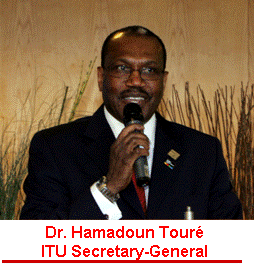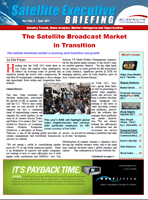Interview with ITU Secretary General Hamadoun Toure
Geneva, Switzerland, September 3, 2012-- The Secretary General of the ITU, Dr. Hamadoun Touré shared his thoughts on sustainable development an the role of satellite technology with our Geneva correspondent Roxana Dunnette. Excerpts of the interview:
Q: At the closing of this summit, how would you describe the progress from 2003 in achieving?
A: It is bigger and bigger, people come back to Geneva as WSIS Forum is an opportunity to report what has been achieved since last year. First they put together policies, now they are happier in the new implementation phase, they share good and bad practices and they see good results on the ground. Whatever seed you plant in ICT with good strategy brings fruits.
Q:Broadband is your growing baby. Intel and partners presented during WSIS a new sales model to make broadband more affordable for emerging markets. How the satellite industry can contribute to accelerate the broadband access and what do they need to do as the delivery cost of the information is the key?
 A: The Broadband Commission for Sustainable Development was put in place by ITU and UNESCO in 2010 to help accelerate the implementation of Millennium goals.
A: The Broadband Commission for Sustainable Development was put in place by ITU and UNESCO in 2010 to help accelerate the implementation of Millennium goals.
ICT is the last goal among 18 others, one that more likely will be met ahead of time.
I am happy to see so many personalities accepting to be commissioners in the Broadband Commission and doing such a fantastic work.
First we did a report in 2010; a reference document to help every country in the world put in place a broadband plan and develops national strategies. Then we divided the plan in thematic clusters to bring the work at the next level to help adopting strategies, create useful applications, and create opportunities and options for countries. The broadband is a key enabler for sustainable development (which is stated in an open letter for Rio+20) and brings together all stakeholders.
I am very proud of the commission and the caliber of its members co-chaired by President Kagame of Rwanda and Carlos Slim Helu, Chairman of Casco group and by over 60 high caliber members working together. The satellite industry is represented by three operators with high level representatives, they are very valuable to us. They presented good models, for example Eutelsat has easy solutions and good prices for the introduction of broadband.
Satellites are able to do broadband in every corner of the world at the same speed and level of quality.
Q: Broadcasting the information via satellites (one to many) is safe and cost effective. Still in implementing ICT applications such as e-education, e-health, e-government developing countries are turning to fiber, like in Sub-Sahara Africa. Why is this so?
A:Many developing countries are using all those technologies fiber at the country level but also satellite. Today satellite proved that is no longer a solution only for rural areas but also for deserving populated area used not only as a back-up when the terrestrial network is down .Nobody sees the difference , in reality the quality is the same. The best solution is a combination of fiber networks and satellite for mobile services and ICTs applications.
Q: The importance of satellites for climate change monitoring and disasters management is fully recognized, so is the work of different ITU study groups. What are the upcoming events to promote the best practices?
A: We are promoting this and we have regular seminars at national and international level, but we also want to make sure that international organization that work with us like WMO have enough timely data .Only satellites can do that in fast manner, monitor and map the world in real time and help collect the information.
Satellites are important tools not only for earth observation, weather conditions and disasters prediction but they are used to help save the planet in terms of bringing solutions that will help reduce emissions of CO2, by reducing travel and using teleconferencing as one example. We at ITU coordinate the satellite orbital locations and we also provide standards that will run that.
Q: 2015 is just around the corner, in your view if you have to name only three important achievements, what would they be?
A: First I hope in bridging the digital divide by 2015 and avoid the impact of a broadband divide.
Second, I wish to see applications of ICTs services like the ones presented at WSIS this year deployed everywhere.
And lastly, I wish to have a concluding result on cyber security and declare in 2015 the cyberspace a peaceful area.





